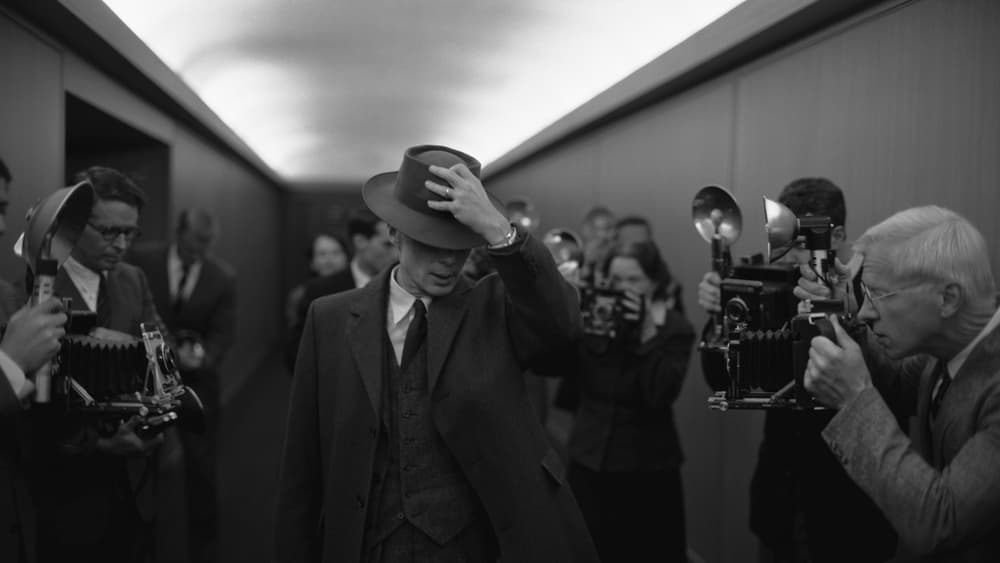-
'Oppenheimer' is as much about making art as it is about making the bomb
by Mitchel Green - July 23, 2023
|
mitchelgreen34@gmail.com
 source: The Movie Database
source: The Movie Database
More than any major Hollywood filmmaker at the moment, Christopher Nolan is obsessed with what the medium can do on a technical level. His insistence on using practical effects over digital whenever possible, his determination to create images unlike anyone else’s by shooting on film IMAX cameras, and the way he uses editing to play with time and space all combine with his formal bravado to create pop spectacle that feels fresh and exciting. To shoot on a film format that is typically reserved for creating a larger sense of scale, and use it to fill the enormous frame mostly with close-ups of people’s faces, is the kind of bold, creative visual choice we don’t often see in big-budget blockbusters today — that it isn’t just a meaningless, show-offy choice and actually gives the viewer a better sense of the scope of the human mind just makes it all the more impressive.
But “Oppenheimer” isn’t just another ambitious formal experiment from a filmmaker whose art can sometimes get sidetracked by technical possibilities to the detriment of thematic or emotional depth. The biographical epic is about ego and ambition, how it can cause us to lose sight of our principles and our morals, and how that personality is encouraged in powerful institutions. In a moment that is both hilariously absurd and depressingly bleak, J. Robert Oppenheimer meets with President Harry Truman to convey his guilt about dropping the atomic bombs on Japan, Truman explains that Oppenheimer doesn’t have “blood on his hands,” he does, and he’s proud of it. He gloats that he was the one who made the decision, and is happy he was given the opportunity to take.
The film is also, in a way, Nolan simultaneously grappling with the immense power he holds in Hollywood, more than possibly any other artist working right now, and reckoning with the fact that these studios don’t want him to have this much power and are actively trying to take it away from him. All of Nolan’s films are, in some way or another, about filmmaking and being an artist. “The Prestige” is about the filmmaker as the bridge between magician and engineer, creating seamless movie magic out of real-world science and technology. “Inception” is about the logistics of producing a film and how artifice, when in the hands of master craftsmen, can lead us to deep emotional catharsis. “Oppenheimer” is about Nolan’s anxieties about throwing away his artistic principles and ceding too much ground to those in power, and how, in trying to re-discover those principles, his last few films have put him into greater conflict with the major players in Hollywood.
You think those who allow you to create what you want, love you for what you are making for them. You think they understand and appreciate your ambition, your knowledge, and your opinion. But they don’t. Just like how the US government loves Oppenheimer for the world power they think his work on the atomic bomb can bring them, the studios love Nolan because of how much money his films can make them. Oppenheimer and Nolan see the result of their work as the work itself, but those that have allowed them both to work view the result as what comes after the project — wealth, power, domination. In this sense, Nolan marvels at the atomic bomb as a work of scientific discovery, of what master technicians and theorists can work together to create. This is why the only sequence where we see the bomb going off is the Trinity test — it’s the end of a production, a screening of the final result — and why this sequence is played more as visual poetry than horrific act. It’s not that what comes next doesn’t concern Nolan, but that he doesn’t really understand it. He’s a filmmaker, not a businessman, just like how Oppenheimer is a physicist, not a politician or a general. Neither man can truly comprehend the effects their work will have on people.
Nolan uses the character of Lewis Strauss (played with sociopathic scumminess by Robert Downey Jr.) as a warning to Hollywood studios — specifically Warner Bros. Discovery, whose handling of “Tenet”’s release caused a fissure in their working relationship. If you are in the industry of making art, and you piss off enough artists, your power will crumble faster than you gained it. In a fortunate bit of timing for the film, “Oppenheimer” has been released in the middle of a writers and actors strike, giving the film a more powerful relevance.
But the way Nolan decides to end his film, not on Strauss failing to be confirmed for his cabinet position, but instead on Oppenheimer telling Albert Einstein that he does feel he has destroyed the world as he feared his early calculations indicated would happen, shows that Nolan’s outlook on the future of his artistic medium is bleak. To Nolan, the end of everything he has ever known is near.

